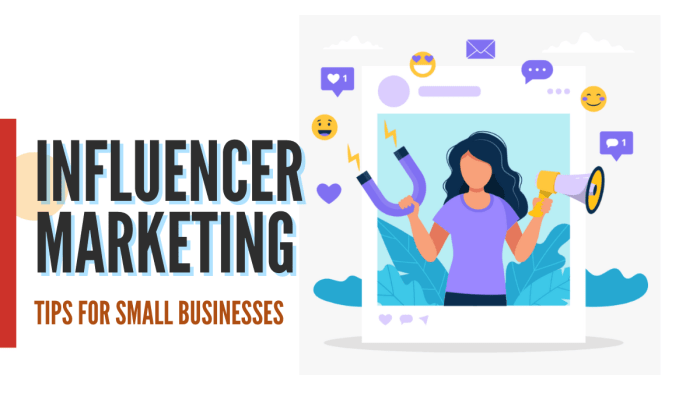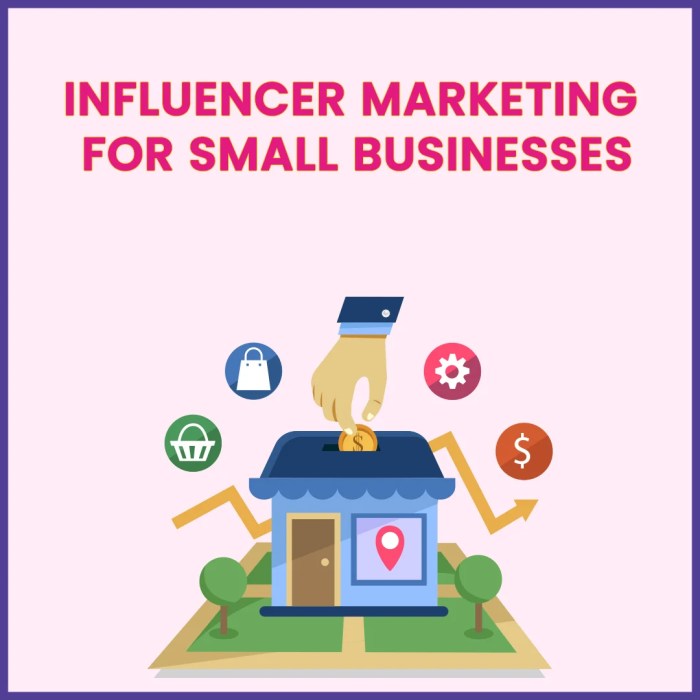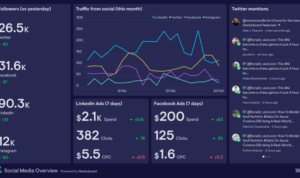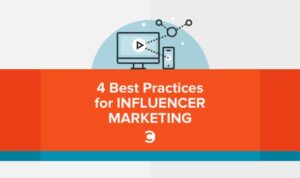Influencer Marketing for Small Business takes center stage, inviting you into a world of social media savvy where small businesses can shine with the help of influential personalities. Get ready to dive into a realm of marketing magic tailored for the modern entrepreneur.
Let’s explore the ins and outs of leveraging influencers to elevate your brand and connect with a wider audience in the digital landscape.
What is Influencer Marketing for Small Business?

Influencer marketing is a form of marketing where businesses collaborate with individuals who have a large following on social media platforms. These influencers promote the products or services of the business to their audience, creating brand awareness and driving sales.
Relevance of Influencer Marketing for Small Businesses
Influencer marketing is particularly beneficial for small businesses as it allows them to reach a larger audience without the need for a large marketing budget. By partnering with influencers who have a niche following that aligns with their target market, small businesses can effectively promote their products or services to a highly engaged audience.
- One successful example of influencer marketing for small businesses is the partnership between a local coffee shop and a popular Instagram influencer. The influencer posted aesthetically pleasing photos of the coffee shop and its products, which attracted a new wave of customers to the business.
- Another example is a small online clothing boutique collaborating with a fashion blogger to showcase their latest collection. The influencer’s endorsement led to increased website traffic and sales for the boutique.
- A skincare brand partnering with a beauty vlogger to review their products on YouTube is also a successful influencer marketing campaign for small businesses. The vlogger’s honest review helped build trust with their audience and drove sales for the brand.
Types of Influencers for Small Business Partnerships
Influencer marketing for small businesses can be incredibly effective when partnering with the right influencers. It’s important to understand the different types of influencers available and how to choose the best fit for your brand.
Micro-Influencers vs. Macro-Influencers
When it comes to influencer partnerships for small businesses, there are two main categories to consider: micro-influencers and macro-influencers.
- Micro-Influencers:
- Have a smaller but highly engaged audience in a specific niche or industry.
- Often have a more personal connection with their followers, leading to higher trust and authenticity.
- Cost-effective for small businesses with limited budgets.
- Higher engagement rates compared to macro-influencers.
- Macro-Influencers:
- Have a larger following, typically in the hundreds of thousands or millions.
- Offer a broader reach and visibility for brands looking to increase brand awareness quickly.
- May come with a higher price tag, making them less budget-friendly for small businesses.
- Less personal connection with followers, which can affect authenticity and trust.
Choosing the Right Influencer
When selecting an influencer for your small business partnership, it’s crucial to consider your target audience and budget to make the most impact.
- Identify your target audience: Look for influencers whose followers align with your ideal customer demographics and interests.
- Engagement over numbers: Focus on the engagement rates of influencers rather than just their follower count. A smaller but engaged audience can drive better results for your business.
- Authenticity and relevance: Choose influencers who genuinely resonate with your brand values and can create authentic content that connects with their audience.
- Budget considerations: Evaluate your budget and choose influencers who offer the best value for your investment, whether it’s through sponsored posts, collaborations, or long-term partnerships.
Implementing an Influencer Marketing Strategy
Influencer marketing can be a powerful tool for small businesses looking to reach a wider audience and increase brand awareness. To create an effective influencer marketing strategy, there are several key steps to consider.
Setting Goals and Identifying KPIs
- Define clear objectives: Determine what you want to achieve through influencer marketing, whether it’s increasing sales, driving website traffic, or boosting social media engagement.
- Identify key performance indicators (KPIs): Choose metrics that align with your goals, such as click-through rates, conversion rates, or social media impressions.
- Set realistic targets: Establish measurable targets to track the success of your influencer campaigns and adjust strategies as needed.
Measuring ROI for Influencer Campaigns
- Track performance metrics: Monitor the performance of your influencer campaigns in real-time to evaluate their impact on your business goals.
- Calculate ROI: Measure the return on investment by comparing the cost of the campaign to the revenue generated or other key metrics.
- Analyze data: Use analytics tools to gather insights on audience engagement, reach, and conversion rates to optimize future campaigns.
Negotiating Contracts and Engaging with Influencers, Influencer Marketing for Small Business
- Establish clear expectations: Clearly Artikel deliverables, timelines, and compensation in influencer contracts to avoid misunderstandings.
- Build relationships: Cultivate genuine relationships with influencers based on trust, communication, and mutual benefits for long-term partnerships.
- Provide creative freedom: Allow influencers creative freedom to authentically promote your brand while aligning with their personal brand and audience.
Monitoring Campaign Performance
- Track campaign progress: Monitor key performance indicators throughout the campaign to ensure it is on track to meet your goals.
- Engage with influencers: Stay in regular communication with influencers to address any issues, provide feedback, and optimize campaign performance.
- Collect feedback: Gather feedback from influencers, customers, and internal stakeholders to assess the impact of the campaign and make adjustments for future strategies.
Compliance and Legal Considerations in Influencer Marketing

In influencer marketing, it is crucial for small businesses to understand and comply with FTC guidelines and disclosure requirements to maintain transparency and trust with their audience. Failure to do so can result in legal issues that may harm the business’s reputation and credibility. Here are some key points to consider:
Importance of FTC Guidelines and Disclosure Requirements
- FTC guidelines require influencers to disclose any material connection or relationship with a brand when promoting products or services.
- Disclosure should be clear, conspicuous, and easily understood by the audience to avoid any confusion or deception.
- Small businesses must educate influencers on the importance of disclosure and monitor compliance to avoid potential legal consequences.
Examples of Legal Issues in Influencer Marketing
- Failure to disclose paid partnerships or sponsorships can lead to fines or legal action from the FTC for deceptive advertising practices.
- Misleading or false claims made by influencers about a product or service can result in lawsuits for false advertising or misrepresentation.
- Using unapproved endorsements or testimonials without proper disclaimers can violate consumer protection laws and damage the brand’s reputation.
Best Practices for Compliance and Transparency
- Educate influencers on FTC guidelines and the importance of disclosure in their content creation.
- Provide clear instructions and templates for proper disclosure to ensure consistency across all influencer collaborations.
- Regularly monitor influencer content for compliance and address any issues promptly to maintain transparency and trust.
- Work with legal counsel to review influencer agreements and ensure all legal requirements are met to protect the business from potential risks.





